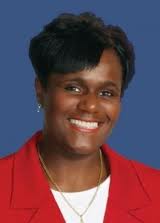Gina Spence Farmer on Crime & Violence
 Describing herself as a former legislator, Gina Spence Farmer appeared before the Joint Select Committee on Crime and Gun Violence this morning [Jan 28].
Describing herself as a former legislator, Gina Spence Farmer appeared before the Joint Select Committee on Crime and Gun Violence this morning [Jan 28].
She said that she was a “Mother who has had to carry the burden of watching her 9-year-old grandson as well as her 27-year-old daughter pick up the broken pieces of her life…after the brutal shooting murder of her husband, James ‘Junior’ Lawes, just under a year ago.” Mr Lawes was shot dead in March 2010, in a triple shooting on Court Street that saw two other men injured.
She also said that she had “witnessed a shooting in broad daylight.” (Court Street daytime shooting at junction Court/Elliott).
Ms Spence spoke from a prepared statement, but also made several extemporaneous comments and observations.
In one of these non-written comments, Ms Spence said that the students at Victor Scott school had re-started school in September 2010 still talking about the April killing that had happened on their school field. Speaking about the aftermaths of these killings, she asked: “What about the 21 children left behind?”
Pointing out that her son-in-law, Mr Lawes, was from Jamaica, she observed that when his body had been returned to Jamaica for burial; his Jamaican relatives and family had expressed shock that he had been killed in Bermuda.
Ms Spence said that their reaction was that they had always seen Bermuda as a safe place and were glad that he escaped the violence of Jamaica. They said that they had thought that “Bermuda is safe” and were glad that James had gotten into Bermuda.
Ms Spence also told of a two-year-old boy who had finally understood what had happened to his recently killed father. She said that later, when this two-year-old saw an armed policeman, he recoiled and showed fear and alarm, calling the policeman a ‘bad man’ who had a gun. His parent had to calm him down and make even more explanations.
Ms Spence’s principal recommendations were that the Premier should lead a “National Day of Mourning, Prayer, and Healing” which should be supported by church, corporate, civic, and community leaders.
She suggested a gun and bladed weapons amnesty to provide an opportunity for people to surrender their guns and weapons to get them off the streets and out of our neighbourhoods.
She recommended a variety of follow-up programs that delivered counseling and support to the families of victims
Describing the night that her son-in-law was shot, she said that she would never forget that “first call when he was shot.” She spoke of the the hospital being locked down and of her family being jammed into a room with two other families because there had been a total of three shootings on that night. She said that the night spent in the hospital could have gone better if the room in which the families were kept had been specially set up for that kind of incident.

